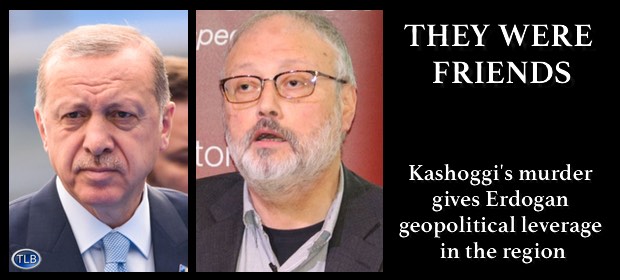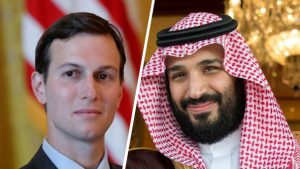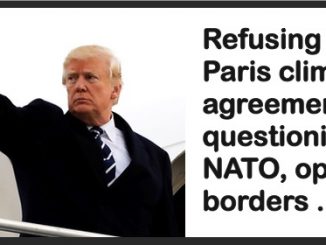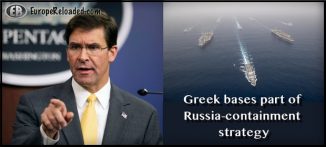
As a result, the denouement of the Khashoggi crisis is likely to alter the dynamics in the long-standing competition between Turkey and Saudi Arabia for leadership of the Islamic world.
It also strengthens Turkey’s position in its transactional alliance with Russia and Iran as they maneuver to end the war in Syria in a manner that cements Bashar al-Assad’s presidency while addressing Turkish concerns.
Turkey’s position in its rivalry with Saudi Arabia is likely to also benefit from the fact that whatever face-saving solution the kingdom adopts is likely to be flawed when tested by available facts and certain to be challenged by a host of critics, even if many will see Turkey as having facilitated a political solution rather than ensuring that the truth is established.
********
Neo-Ottomanism Surges in Middle East Politics
MELKULANGARA BHADRAKUMAR
The fate of Saudi Crown Prince Mohammed bin Salman hangs in the balance. The common perception is that everything depends on which way President Donald Trump moves: to go for his own preferenceto bury the scandal over Jamal Khashoggi’s disappearance, or give in to the rising demand that Saudi-American relations can no longer be business as usual. Trump’s mood swing suggests he is dithering.
bury the scandal over Jamal Khashoggi’s disappearance, or give in to the rising demand that Saudi-American relations can no longer be business as usual. Trump’s mood swing suggests he is dithering.
Yet, it is Turkey – more precisely, President Recep Erdogan – who is the real arbiter. The Turks have let it be known that they are in possession of materials that expose Khashoggi’s murder. But the official position is that the onus is on the Saudis to prove that Khashoggi left their consulate in Istanbul alive.
The Saudis responded with alacrity by mooting the proposal to form “a joint action team” with “brotherly” Turkey. Turkey agreed and a Saudi team arrived in Turkey on Friday. But Riyadh and Ankara are apparently at odds. Meanwhile, reports appeared that Turkish intelligence has recordings of Khashoggi’s purported killing. Ankara has not disclaimed these reports.
 Foreign Minister Mevlut Cavusoglu (pictured) said on Saturday, “There is consensus on forming a joint working group with Saudi Arabia… It is natural for everyone to show awareness of the case and want it to be clarified.” However, he stressed that Turkey’s own investigation will proceed independently and it is “getting deeper”. He regretted that Saudi cooperation was not optimal. Equally, the spokesman of the ruling Justice and Development Party Omer Celik warned ominously against any “cover-up”:
Foreign Minister Mevlut Cavusoglu (pictured) said on Saturday, “There is consensus on forming a joint working group with Saudi Arabia… It is natural for everyone to show awareness of the case and want it to be clarified.” However, he stressed that Turkey’s own investigation will proceed independently and it is “getting deeper”. He regretted that Saudi cooperation was not optimal. Equally, the spokesman of the ruling Justice and Development Party Omer Celik warned ominously against any “cover-up”:
“The president is following the matter closely. Turkey’s independent investigation is ongoing. It is a very critical matter. There are speculative claims that a respectful journalist was killed. Such an action is an attack on all the values of the democratic world. It involves the Republic of Turkey directly. This individual went missing on our soil. He entered the premises and did not re-emerge. It will eventually become clear how he went missing, what happened and who organized it. The disappearance of Khashoggi cannot be covered up. “
Cavusoglu, who is on a visit to London, also hinted he might raise the issue with his British counterpart. Significantly, Turkish analysts and circles close to the ruling party have taken an openly  hostile stance vis-à-vis Saudi Crown Prince Mohamed bin Salman (MBS).
hostile stance vis-à-vis Saudi Crown Prince Mohamed bin Salman (MBS).
Their narrative harks back to the persistent Turkish allegation that MBS and the UAE Crown Prince Mohammed bin Zayed have been the cat’s paw of the US and British and Israeli intelligence in the various hot spots in the Middle East – Syria, Iraq, Yemen, etc. – and even had a hand in the failed coup attempt against Erdogan two years ago.
According to this narrative, Istanbul was probably chosen as the venue of the ghastly incident, since Erdogan has been giving refuge to fugitives who oppose the two Gulf regimes – alluding to Khashoggi’s friendship with Erdogan and their shared affinity with the Muslim Brotherhood. Ibrahim Karagul, leading editor and a staunch supporter of Erdogan, wrote,
“Turkey must call Salman and Zayed to account… It must ask them to pay for the crimes they committed against our country… They think they can do anything with money and buy everyone… Our file is ready. We are going to hold them responsible not only for the Jamal Khashoggi incident, but for many things, including the July 15, 2016 coup attempt, financing terrorism against our country, arming the PKK and Daesh, the war they are carrying on against our country in northern Syria, and their cooperation in multinational attacks, including the assassination attempt on our president.”
The fact that the Saudi investigation team is headed by Prince Khalid Al Faisal, the third son of King Faisal (and a senior member of the al Turki clan), underscores that the House of Saud senses an existential moment. To be sure, Erdogan is playing his cards shrewdly. He is keeping an uncharacteristically low profile himself and speaking only the bare minimum that is necessary, but has let media leaks continue in a steady stream that has inflamed the western opinion against the Saudi regime.
Trump is having a hard time coping with Erdogan’s “maximum pressure”. On Saturday, he resorted to the “Art of the Deal”. On the sidelines of the release of the American pastor by a Turkish judge on October 12, Trump laid it on a bit thick: “This is a tremendous step towards having the kind of relationship (with Turkey) which can be a great relationship. We feel much differently about Turkey today than we did yesterday. And I think we have a chance of really becoming much closer to Turkey  and maybe having a very, very good relationship.” Making nice with Erdogan has become important: Trump has reason to worry that his son-in-law Jared Kushner’s close ties to the crown princes of Saudi Arabia and the UAE may come under scrutiny at some point during the investigation into the Khashoggi affair.
and maybe having a very, very good relationship.” Making nice with Erdogan has become important: Trump has reason to worry that his son-in-law Jared Kushner’s close ties to the crown princes of Saudi Arabia and the UAE may come under scrutiny at some point during the investigation into the Khashoggi affair.
Indeed, many possibilities open in front of Erdogan. Quite obviously, it presents him with just the reason to re-engage with the Trump administration from a perspective of being on the right side of history. But the big question is, what is Erdogan’s agenda? To be sure, his “neo-Ottomanism” is on a roll now that Saudi Arabia has painted itself into a corner.
Clearly, the US-backed alliance between Saudi Arabia, the UAE, Israel and Egypt to contain Iran does not make a new regional order. Erdogan will now assert Turkey’s leadership role in the Muslim Middle East. Importantly, he is known to champion the Muslim Brotherhood as the charioteer of a New Middle East.
************
Original article
ER recommends other articles by Strategic Culture Foundation




